新概念英语第二册Lesson 2 breakfast or lunch 课件(共19张PPT)
文档属性
| 名称 | 新概念英语第二册Lesson 2 breakfast or lunch 课件(共19张PPT) | 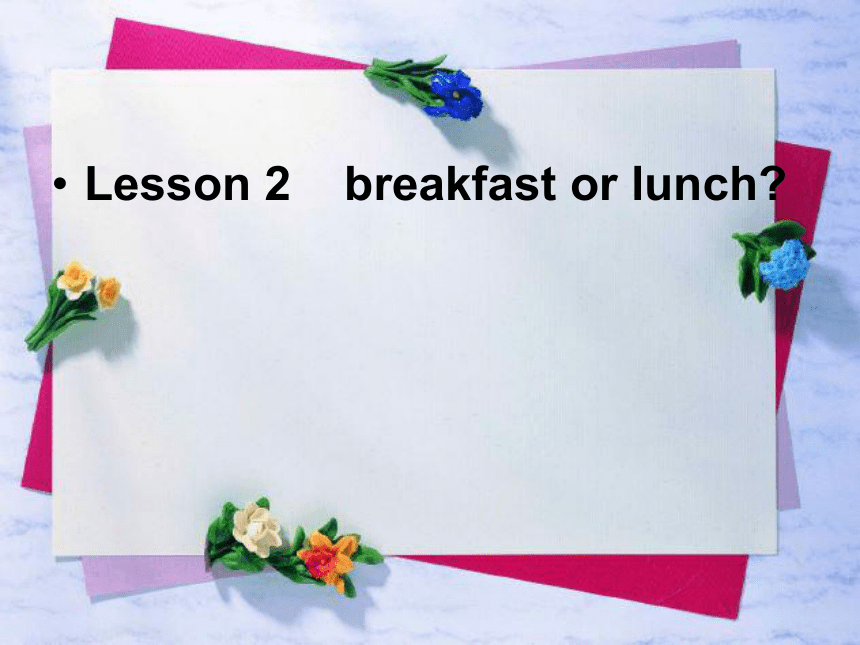 | |
| 格式 | ppt | ||
| 文件大小 | 435.0KB | ||
| 资源类型 | 教案 | ||
| 版本资源 | 新概念英语 | ||
| 科目 | 英语 | ||
| 更新时间 | 2024-01-06 08:49:34 | ||
图片预览

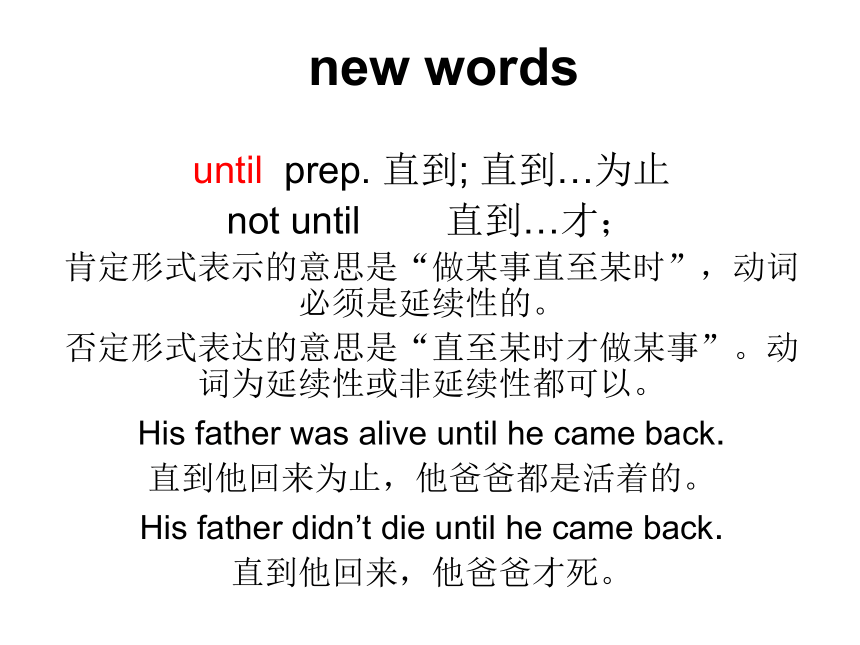
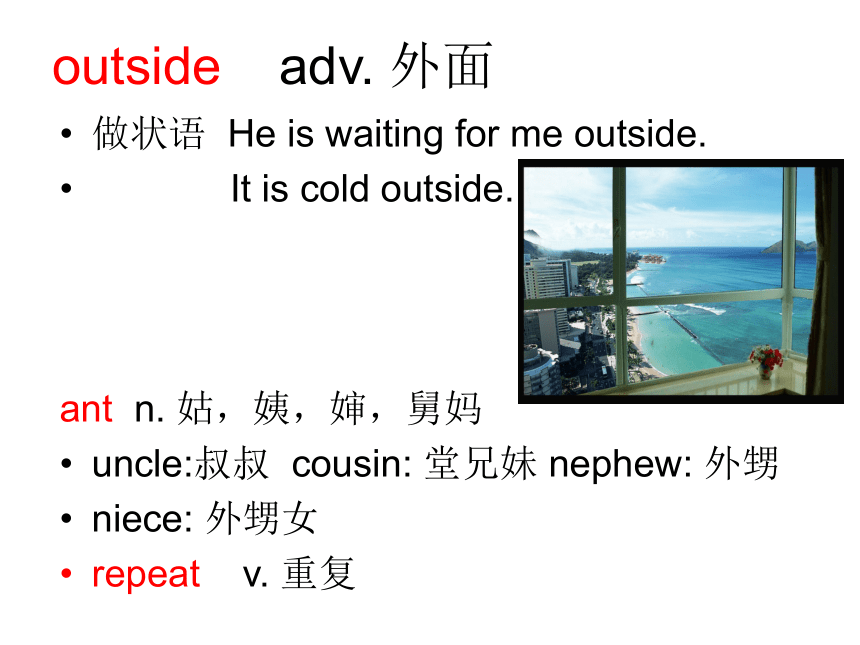
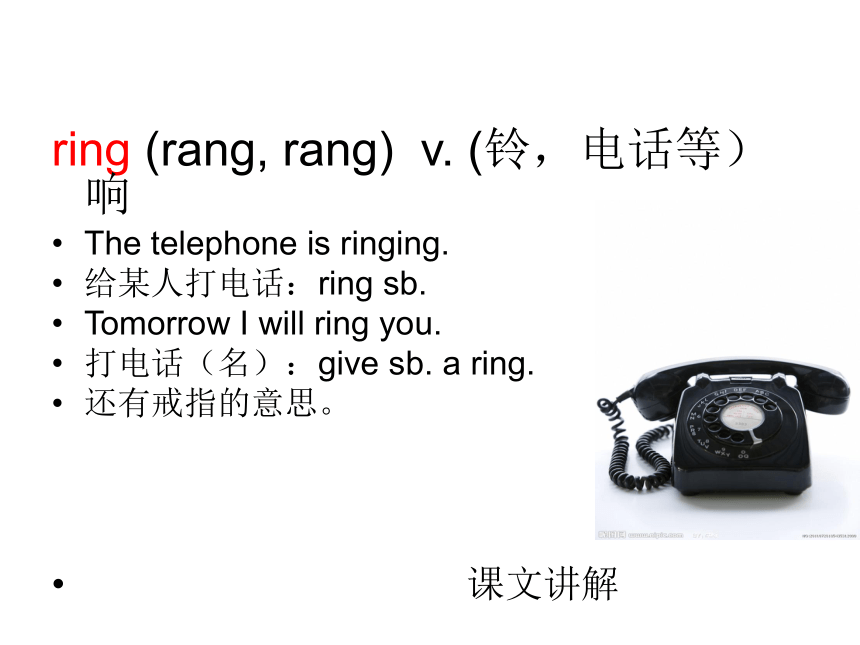
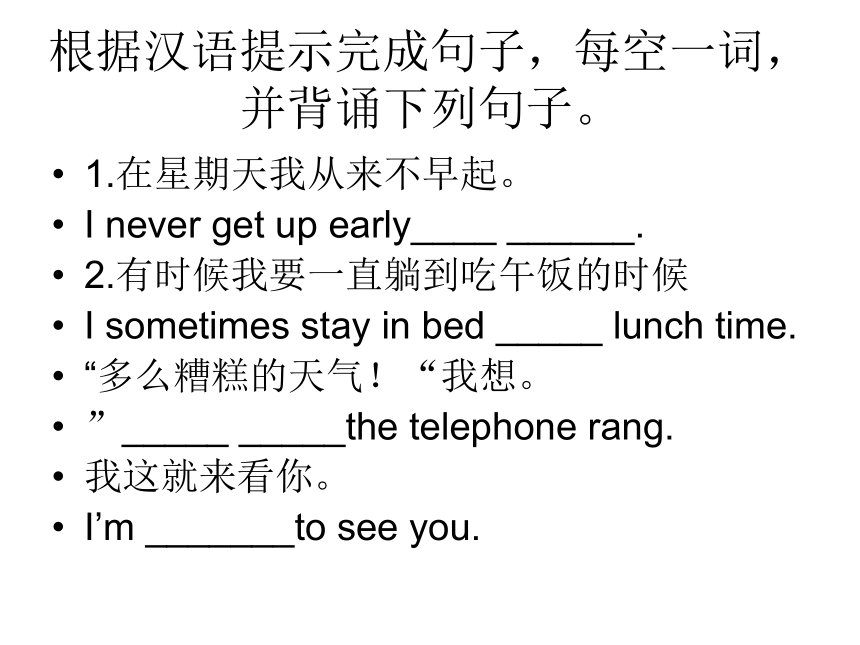
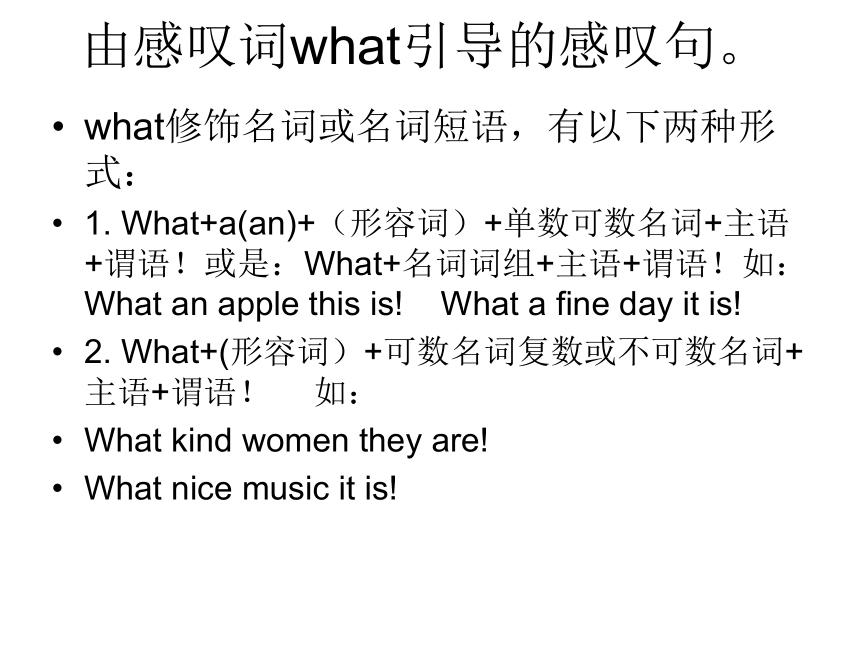
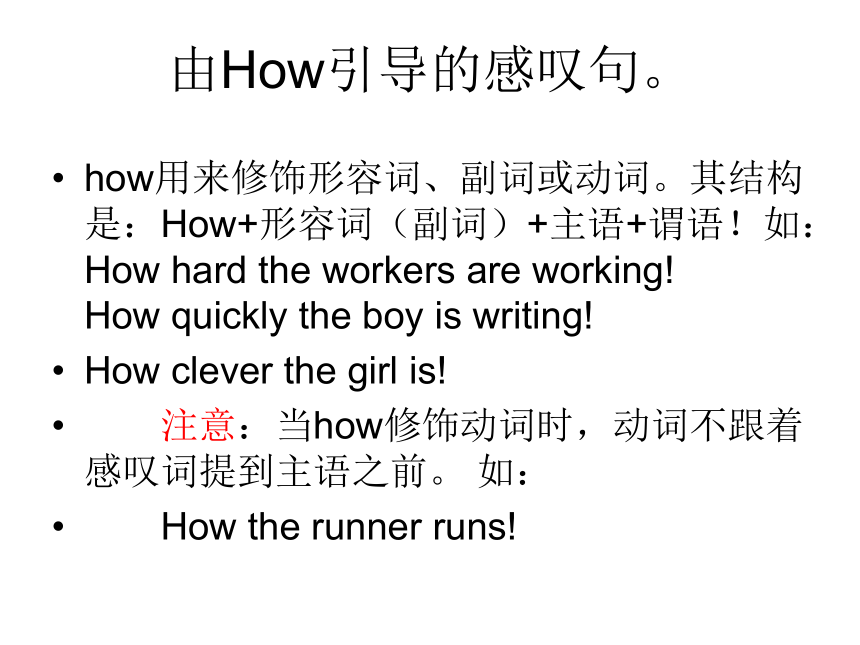
文档简介
(共19张PPT)
Lesson 2 breakfast or lunch
new words
until prep. 直到; 直到…为止
not until 直到…才;
肯定形式表示的意思是“做某事直至某时”,动词必须是延续性的。
否定形式表达的意思是“直至某时才做某事”。动词为延续性或非延续性都可以。
His father was alive until he came back.
直到他回来为止,他爸爸都是活着的。
His father didn’t die until he came back.
直到他回来,他爸爸才死。
outside adv. 外面
做状语 He is waiting for me outside.
It is cold outside.
ant n. 姑,姨,婶,舅妈
uncle:叔叔 cousin: 堂兄妹 nephew: 外甥
niece: 外甥女
repeat v. 重复
ring (rang, rang) v. (铃,电话等)响
The telephone is ringing.
给某人打电话:ring sb.
Tomorrow I will ring you.
打电话(名):give sb. a ring.
还有戒指的意思。
课文讲解
根据汉语提示完成句子,每空一词,并背诵下列句子。
1.在星期天我从来不早起。
I never get up early____ ______.
2.有时候我要一直躺到吃午饭的时候
I sometimes stay in bed _____ lunch time.
“多么糟糕的天气!“我想。
”_____ _____the telephone rang.
我这就来看你。
I’m _______to see you.
由感叹词what引导的感叹句。
what修饰名词或名词短语,有以下两种形式:
1. What+a(an)+(形容词)+单数可数名词+主语+谓语!或是:What+名词词组+主语+谓语!如: What an apple this is! What a fine day it is!
2. What+(形容词)+可数名词复数或不可数名词+主语+谓语! 如:
What kind women they are!
What nice music it is!
由How引导的感叹句。
how用来修饰形容词、副词或动词。其结构是:How+形容词(副词)+主语+谓语!如: How hard the workers are working! How quickly the boy is writing!
How clever the girl is!
注意:当how修饰动词时,动词不跟着感叹词提到主语之前。 如:
How the runner runs!
what与how引导的感叹句,一般情况下可以相互转换,转换后意义不变。如: What an interesting story it is!==How interesting the story is! what a beautiful building it is!==How beautiful the building is!
表示频度的副词
never, sometimes, often, always, seldom
I’m never late for appointments.
Sometimes he tells us jokes.
We often meet at the coffee shop.
She is always nice and friendly to people.
I seldom watch TV.
根据发生频率的大小排序:从大到小:
____>____>____>____>____
讲解句型一般现在时和现在进行时。
一般现在时:表示通常性、规律性、习惯性的状态或者动作(有时间规律发生的事件)的一种时间状态 在一般现在时中,当主语是第三人称单数时,谓语动词要用第三人称单数形式,即常在动词原形后加-s或-es。
什么是是第三人称单数?
一、人称代词he, she, it是第三人称单数。如: He likes watching TV. 他喜欢看电视。 She has lunch at twelve. 她十二点吃午餐。 It looks like a cat. 它看起来像只猫。(口诀:I用am,you用are,is用于她他它,单数名词用is,复数名词都用are) 二、单个人名、地名或称呼作主语;是第三人称单数。如: ①Han Mei looks like her mother. 韩梅看起来像她的母亲。 ②Beijing is in China. 北京在中国。 ③Uncle Wang often makes cakes. 王叔叔经常做蛋糕。
三、单数可数名词或“this / that / the+单数 可数名词”作主语时,是第三人称单数。如: ①A horse is a useful animal. 马是有用的动物。 ②This book is yours. 这本书是你的。
四、不定代词someone, somebody, nobody, everything, something等及指示代词this, that作主语时,是第三人称单数。如: ①Everyone is here. 大家到齐了。 ②There is something wrong with the watch. 这块手表有毛病。
五、不可数名词作主语时为第三人称单数。如: ①The milk is in the glass. 牛奶在玻璃杯里。 ②The bread is very small. 那面包很小。 六、当数字或字母作主语时,看作第三人称单数。如: ①"6" is a lucky number. "6"是个吉利数字。
现在进行时: 表示正在进行的、发生的动作
通常在句子中有以下的词:now, look, listen. 句子的结构如下:(be) am、 is 、are +动词 ing
肯定句:be + doing 否定句:be not + doing 疑问句:Be + 主语 + doing?
肯定句:1. I am listening to the music now. 2. The students are drawing pictures now. 3. Listen! She is singing . 4. Look! Mr Li is riding a bike.
否定句:1.I am not (I’m not)listening to the music now. 2.The students are not(aren’t) drawing pictures now.
疑问句: 1. Listen! Is Amy singing Yes, she is.\No, she isn’t. 2. What are they doing They are (They’re) swimming.
其中,动词的ing形式有如下方法:
1. 在动词后直接加ing,如:
go-going , wash-washing, fly—flying 2. 以不发音字母e结尾 , 去掉e再加ing,如 :drive—driving, ride—riding, skate-skating, make-making, have-having, write-writing, take-taking, dive-diving, dance-dancing, come-coming 3.双写双写末尾字母,再加ing,如:
swim- swimming, run—running,get—getting, put-putting, set-setting
练习:
1.Mr Zheng __________(read) a book now. 2. The rabbits ________(jump) now. 3.. Look ! Tom and John ______(swim). 4. My brother ______(make) a kite in his room now. 5. Look! The bus ________(stop). 6. We______ (have) an English class now. 7. Listen! Someone is_______ (come).
8. What are they doing They______ (catch) butterflies now. 9. What is he doing He_______ (do) an experiment now. 10. Are they collecting leaves No, they’re not. They_____ (collect) stamps now. 11. Look! He ________(dive) now. 12. Tom _______( watch ) TV in the dining room.
discussion
The writer never gets up early on Sundays. Do you often get up late on weekends? Is it good for us What should we do ( 作者周日从不早起,你在周末也经常睡到很晚吗?这样对我们好吗?我们应该怎么做?)
Lesson 2 breakfast or lunch
new words
until prep. 直到; 直到…为止
not until 直到…才;
肯定形式表示的意思是“做某事直至某时”,动词必须是延续性的。
否定形式表达的意思是“直至某时才做某事”。动词为延续性或非延续性都可以。
His father was alive until he came back.
直到他回来为止,他爸爸都是活着的。
His father didn’t die until he came back.
直到他回来,他爸爸才死。
outside adv. 外面
做状语 He is waiting for me outside.
It is cold outside.
ant n. 姑,姨,婶,舅妈
uncle:叔叔 cousin: 堂兄妹 nephew: 外甥
niece: 外甥女
repeat v. 重复
ring (rang, rang) v. (铃,电话等)响
The telephone is ringing.
给某人打电话:ring sb.
Tomorrow I will ring you.
打电话(名):give sb. a ring.
还有戒指的意思。
课文讲解
根据汉语提示完成句子,每空一词,并背诵下列句子。
1.在星期天我从来不早起。
I never get up early____ ______.
2.有时候我要一直躺到吃午饭的时候
I sometimes stay in bed _____ lunch time.
“多么糟糕的天气!“我想。
”_____ _____the telephone rang.
我这就来看你。
I’m _______to see you.
由感叹词what引导的感叹句。
what修饰名词或名词短语,有以下两种形式:
1. What+a(an)+(形容词)+单数可数名词+主语+谓语!或是:What+名词词组+主语+谓语!如: What an apple this is! What a fine day it is!
2. What+(形容词)+可数名词复数或不可数名词+主语+谓语! 如:
What kind women they are!
What nice music it is!
由How引导的感叹句。
how用来修饰形容词、副词或动词。其结构是:How+形容词(副词)+主语+谓语!如: How hard the workers are working! How quickly the boy is writing!
How clever the girl is!
注意:当how修饰动词时,动词不跟着感叹词提到主语之前。 如:
How the runner runs!
what与how引导的感叹句,一般情况下可以相互转换,转换后意义不变。如: What an interesting story it is!==How interesting the story is! what a beautiful building it is!==How beautiful the building is!
表示频度的副词
never, sometimes, often, always, seldom
I’m never late for appointments.
Sometimes he tells us jokes.
We often meet at the coffee shop.
She is always nice and friendly to people.
I seldom watch TV.
根据发生频率的大小排序:从大到小:
____>____>____>____>____
讲解句型一般现在时和现在进行时。
一般现在时:表示通常性、规律性、习惯性的状态或者动作(有时间规律发生的事件)的一种时间状态 在一般现在时中,当主语是第三人称单数时,谓语动词要用第三人称单数形式,即常在动词原形后加-s或-es。
什么是是第三人称单数?
一、人称代词he, she, it是第三人称单数。如: He likes watching TV. 他喜欢看电视。 She has lunch at twelve. 她十二点吃午餐。 It looks like a cat. 它看起来像只猫。(口诀:I用am,you用are,is用于她他它,单数名词用is,复数名词都用are) 二、单个人名、地名或称呼作主语;是第三人称单数。如: ①Han Mei looks like her mother. 韩梅看起来像她的母亲。 ②Beijing is in China. 北京在中国。 ③Uncle Wang often makes cakes. 王叔叔经常做蛋糕。
三、单数可数名词或“this / that / the+单数 可数名词”作主语时,是第三人称单数。如: ①A horse is a useful animal. 马是有用的动物。 ②This book is yours. 这本书是你的。
四、不定代词someone, somebody, nobody, everything, something等及指示代词this, that作主语时,是第三人称单数。如: ①Everyone is here. 大家到齐了。 ②There is something wrong with the watch. 这块手表有毛病。
五、不可数名词作主语时为第三人称单数。如: ①The milk is in the glass. 牛奶在玻璃杯里。 ②The bread is very small. 那面包很小。 六、当数字或字母作主语时,看作第三人称单数。如: ①"6" is a lucky number. "6"是个吉利数字。
现在进行时: 表示正在进行的、发生的动作
通常在句子中有以下的词:now, look, listen. 句子的结构如下:(be) am、 is 、are +动词 ing
肯定句:be + doing 否定句:be not + doing 疑问句:Be + 主语 + doing?
肯定句:1. I am listening to the music now. 2. The students are drawing pictures now. 3. Listen! She is singing . 4. Look! Mr Li is riding a bike.
否定句:1.I am not (I’m not)listening to the music now. 2.The students are not(aren’t) drawing pictures now.
疑问句: 1. Listen! Is Amy singing Yes, she is.\No, she isn’t. 2. What are they doing They are (They’re) swimming.
其中,动词的ing形式有如下方法:
1. 在动词后直接加ing,如:
go-going , wash-washing, fly—flying 2. 以不发音字母e结尾 , 去掉e再加ing,如 :drive—driving, ride—riding, skate-skating, make-making, have-having, write-writing, take-taking, dive-diving, dance-dancing, come-coming 3.双写双写末尾字母,再加ing,如:
swim- swimming, run—running,get—getting, put-putting, set-setting
练习:
1.Mr Zheng __________(read) a book now. 2. The rabbits ________(jump) now. 3.. Look ! Tom and John ______(swim). 4. My brother ______(make) a kite in his room now. 5. Look! The bus ________(stop). 6. We______ (have) an English class now. 7. Listen! Someone is_______ (come).
8. What are they doing They______ (catch) butterflies now. 9. What is he doing He_______ (do) an experiment now. 10. Are they collecting leaves No, they’re not. They_____ (collect) stamps now. 11. Look! He ________(dive) now. 12. Tom _______( watch ) TV in the dining room.
discussion
The writer never gets up early on Sundays. Do you often get up late on weekends? Is it good for us What should we do ( 作者周日从不早起,你在周末也经常睡到很晚吗?这样对我们好吗?我们应该怎么做?)
同课章节目录
